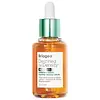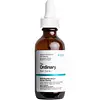What's inside
What's inside
 Key Ingredients
Key Ingredients

 Benefits
Benefits

 Concerns
Concerns

No concerns
 Ingredients Side-by-side
Ingredients Side-by-side

Water
Skin ConditioningPropanediol
SolventGlycerin
HumectantPentylene Glycol
Skin ConditioningBetaine
HumectantCoco-Caprylate/Caprate
EmollientCaffeine
Skin ConditioningCopper Tripeptide-34
Skin ConditioningNiacinamide
SmoothingCastor Oil/Ipdi Copolymer
Aloe Barbadensis Leaf Juice
Skin ConditioningCoffea Arabica Seed Oil
MaskingPanax Ginseng Root Extract
EmollientBiotin
AntiseborrhoeicCaprylic/Capric Triglyceride
MaskingLimnanthes Alba Seed Oil
Skin ConditioningCarbomer
Emulsion StabilisingLindera Strychnifolia Root Extract
Skin ConditioningHippophae Rhamnoides Oil
EmollientTrisodium Ethylenediamine Disuccinate
Acacia Senegal Gum
MaskingXanthan Gum
EmulsifyingPhyllanthus Emblica Fruit Extract
HumectantTocopheryl Acetate
AntioxidantHelianthus Annuus Hybrid Oil
EmollientLamium Album Extract
AstringentPlantago Psyllium Seed Extract
Skin ConditioningPanthenol
Skin ConditioningC12-15 Alkyl Benzoate
AntimicrobialSodium Metabisulfite
AntioxidantLarix Europaea Wood Extract
HumectantGlycine
BufferingTocopherol
AntioxidantUbiquinone
AntioxidantZinc Chloride
AntimicrobialSimmondsia Chinensis Seed Oil
EmollientLithospermum Erythrorhizon Root Extract
Skin ConditioningCamellia Sinensis Leaf Extract
AntimicrobialCitric Acid
BufferingPotassium Sorbate
PreservativeSodium Benzoate
MaskingSodium Hydroxide
BufferingBenzyl Alcohol
PerfumingCaramel
Cosmetic ColorantWater, Propanediol, Glycerin, Pentylene Glycol, Betaine, Coco-Caprylate/Caprate, Caffeine, Copper Tripeptide-34, Niacinamide, Castor Oil/Ipdi Copolymer, Aloe Barbadensis Leaf Juice, Coffea Arabica Seed Oil, Panax Ginseng Root Extract, Biotin, Caprylic/Capric Triglyceride, Limnanthes Alba Seed Oil, Carbomer, Lindera Strychnifolia Root Extract, Hippophae Rhamnoides Oil, Trisodium Ethylenediamine Disuccinate, Acacia Senegal Gum, Xanthan Gum, Phyllanthus Emblica Fruit Extract, Tocopheryl Acetate, Helianthus Annuus Hybrid Oil, Lamium Album Extract, Plantago Psyllium Seed Extract, Panthenol, C12-15 Alkyl Benzoate, Sodium Metabisulfite, Larix Europaea Wood Extract, Glycine, Tocopherol, Ubiquinone, Zinc Chloride, Simmondsia Chinensis Seed Oil, Lithospermum Erythrorhizon Root Extract, Camellia Sinensis Leaf Extract, Citric Acid, Potassium Sorbate, Sodium Benzoate, Sodium Hydroxide, Benzyl Alcohol, Caramel
Water
Skin ConditioningPropanediol
SolventButylene Glycol
HumectantGlycerin
HumectantCaffeine
Skin ConditioningBiotinoyl Tripeptide-1
Acetyl Tetrapeptide-3
Skin ProtectingLarix Europaea Wood Extract
HumectantPisum Sativum Extract
Skin ConditioningScutellaria Baicalensis Root Extract
AstringentTriticum Vulgare Germ Extract
Skin ConditioningGlycine Soja Germ Extract
EmollientTrifolium Pratense Flower Extract
AstringentCamellia Sinensis Leaf Extract
AntimicrobialApigenin
AntioxidantOleanolic Acid
Skin ConditioningArginine
MaskingGlycine
BufferingCalcium Gluconate
HumectantZinc Chloride
AntimicrobialLactic Acid
BufferingGluconolactone
Skin ConditioningDextran
Maltodextrin
AbsorbentHydroxyethylcellulose
Emulsion StabilisingXanthan Gum
EmulsifyingPentylene Glycol
Skin ConditioningDimethyl Isosorbide
SolventPolysorbate 20
EmulsifyingPPG-26-Buteth-26
Skin ConditioningPEG-40 Hydrogenated Castor Oil
EmulsifyingTrisodium Ethylenediamine Disuccinate
Sodium Metabisulfite
AntioxidantSodium Benzoate
MaskingPhenoxyethanol
PreservativeChlorphenesin
AntimicrobialWater, Propanediol, Butylene Glycol, Glycerin, Caffeine, Biotinoyl Tripeptide-1, Acetyl Tetrapeptide-3, Larix Europaea Wood Extract, Pisum Sativum Extract, Scutellaria Baicalensis Root Extract, Triticum Vulgare Germ Extract, Glycine Soja Germ Extract, Trifolium Pratense Flower Extract, Camellia Sinensis Leaf Extract, Apigenin, Oleanolic Acid, Arginine, Glycine, Calcium Gluconate, Zinc Chloride, Lactic Acid, Gluconolactone, Dextran, Maltodextrin, Hydroxyethylcellulose, Xanthan Gum, Pentylene Glycol, Dimethyl Isosorbide, Polysorbate 20, PPG-26-Buteth-26, PEG-40 Hydrogenated Castor Oil, Trisodium Ethylenediamine Disuccinate, Sodium Metabisulfite, Sodium Benzoate, Phenoxyethanol, Chlorphenesin
 Reviews
Reviews

Ingredients Explained
These ingredients are found in both products.
Ingredients higher up in an ingredient list are typically present in a larger amount.
Caffeine is most associated with coffee, tea, and cacao. In skincare, it helps with calming inflammation and is rich in antioxidants.
While caffeine is used to treat cellulite and and dark circles, further studies are needed to prove this. It has been believed to help with these skin conditions due to its ability to dilate blood vessels and increase blood flow.
Some studies are looking into caffeine's ability to protect against UV rays.
Learn more about CaffeineCamellia Sinensis Leaf Extract is derived from the leaves of the tea plant. Black tea, green tea, and oolong tea are all harvested from this plant.
This ingredient has many skin benefits:
This ingredient contains polyphenols, a strong antioxidant. Antioxidants help fight off molecules that damage skin cells.
On top of that, the antioxidants in green tea neutralize free-radicals from the sun. This gives the skin some extra UV protection, but should not replace sunscreen.
Many components of tea have anti-inflammatory properties.
Polyphenols and L-theanine help soothe the skin and reduce irritation. The caffeine in Camellia Sinensis Leaf Extract helps calm inflamed blood vessels.
Other compounds found in tea include: Vitamin Bs, linoleic acid, magnesium, calcium, iron, and zinc.
Research has shown both drinking Camellia Sinensis Leaf Tea and applying it to the skin can help boost skin elasticity and hydration. Studies also show using tea extract may reduce sebum, or oil, production.
Learn more about Camellia Sinensis Leaf ExtractGlycerin is already naturally found in your skin. It helps moisturize and protect your skin.
A study from 2016 found glycerin to be more effective as a humectant than AHAs and hyaluronic acid.
As a humectant, it helps the skin stay hydrated by pulling moisture to your skin. The low molecular weight of glycerin allows it to pull moisture into the deeper layers of your skin.
Hydrated skin improves your skin barrier; Your skin barrier helps protect against irritants and bacteria.
Glycerin has also been found to have antimicrobial and antiviral properties. Due to these properties, glycerin is often used in wound and burn treatments.
In cosmetics, glycerin is usually derived from plants such as soybean or palm. However, it can also be sourced from animals, such as tallow or animal fat.
This ingredient is organic, colorless, odorless, and non-toxic.
Glycerin is the name for this ingredient in American English. British English uses Glycerol/Glycerine.
Learn more about GlycerinThis ingredient is an amino acid that helps build proteins and moisturizes skin. It is already present in our skin as our bodies produce them naturally.
Glycine already plays a role in helping keep our skin moisturized as amino acids transport moisture throughout our skin.
As collagen is made up of glycine and other amino acids, it is believed glycine may help our skin produce more collagen.
Learn more about GlycineLarix Europaea is a larch tree native to Europe.
It’s one of the key ingredients in Redensyl, an alternative to Minoxidil for hair growth. Redensyl works by targeting stem cells and fibroblasts from the top, inner layer of your skin.
The bark of Larix Europaea is rich in antioxidants and plant compounds such as flavonoids, spiro-polyphenols, and procyanidins.
Flavonoids are naturally occurring compounds found in many plantsand foods like tea, wine, and chocolate. They’re known for their strong antioxidant and anti-inflammatory properties.
Learn more about Larix Europaea Wood ExtractPentylene glycol is typically used within a product to thicken it. It also adds a smooth, soft, and moisturizing feel to the product. It is naturally found in plants such as sugar beets.
The hydrophilic trait of Pentylene Glycol makes it a humectant. As a humectant, Pentylene Glycol helps draw moisture from the air to your skin. This can help keep your skin hydrated.
This property also makes Pentylene Glycol a great texture enhancer. It can also help thicken or stabilize a product.
Pentylene Glycol also acts as a mild preservative and helps to keep a product microbe-free.
Some people may experience mild eye and skin irritation from Pentylene Glycol. We always recommend speaking with a professional about using this ingredient in your routine.
Pentylene Glycol has a low molecular weight and is part of the 1,2-glycol family.
Learn more about Pentylene GlycolPropanediol is an all-star ingredient. It softens, hydrates, and smooths the skin.
It’s often used to:
Propanediol is not likely to cause sensitivity and considered safe to use. It is derived from corn or petroleum with a clear color and no scent.
Learn more about PropanediolSodium Benzoate is a preservative. It's used in both cosmetic and food products to inhibit the growth of mold and bacteria. It is typically produced synthetically.
Both the US FDA and EU Health Committee have approved the use of sodium benzoate. In the US, levels of 0.1% (of the total product) are allowed.
Sodium benzoate works as a preservative by inhibiting the growth of bacteria inside of cells. It prevents the cell from fermenting a type of sugar using an enzyme called phosphofructokinase.
It is the salt of benzoic acid. Foods containing sodium benzoate include soda, salad dressings, condiments, fruit juices, wines, and snack foods.
Studies for using ascorbic acid and sodium benzoate in cosmetics are lacking, especially in skincare routines with multiple steps.
We always recommend speaking with a professional, such as a dermatologist, if you have any concerns.
Learn more about Sodium BenzoateSodium metabisulfite is also known as Sodium Pyrosulfite. It is a preservative, antioxidant, and disinfectant.
As a preservative, it helps stabilize cosmetic formulas without affecting their color or scent.
Trisodium Ethylenediamine Disuccinate is used to help stabilize a product.
It is a chelating agent, meaning it helps prevent metal ions from binding to other ingredients. This prevents unwanted reactions in products. Metal ions can come into a product via the water ingredient. They are found in trace amounts and are not known to be harmful.
Water. It's the most common cosmetic ingredient of all. You'll usually see it at the top of ingredient lists, meaning that it makes up the largest part of the product.
So why is it so popular? Water most often acts as a solvent - this means that it helps dissolve other ingredients into the formulation.
You'll also recognize water as that liquid we all need to stay alive. If you see this, drink a glass of water. Stay hydrated!
Learn more about WaterXanthan gum is used as a stabilizer and thickener within cosmetic products. It helps give products a sticky, thick feeling - preventing them from being too runny.
On the technical side of things, xanthan gum is a polysaccharide - a combination consisting of multiple sugar molecules bonded together.
Xanthan gum is a pretty common and great ingredient. It is a natural, non-toxic, non-irritating ingredient that is also commonly used in food products.
Learn more about Xanthan GumZinc chloride is a white crystalline compound. You'll most likely see it in personal care products such as mouthwashes, skincare, hair conditioners, and bath products.